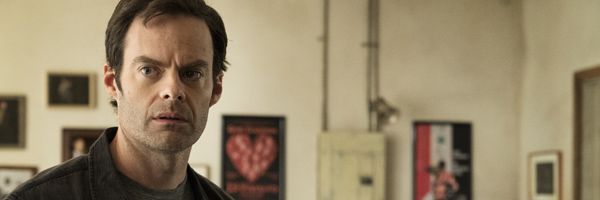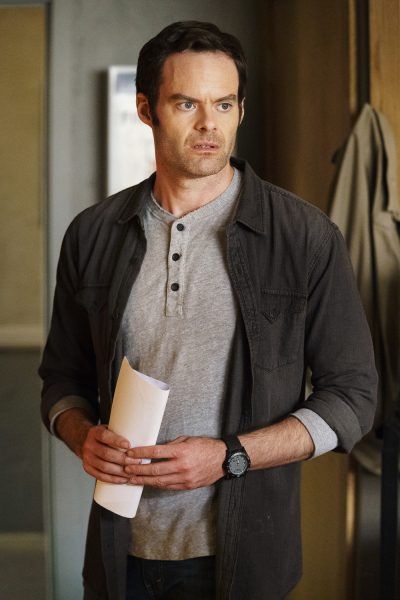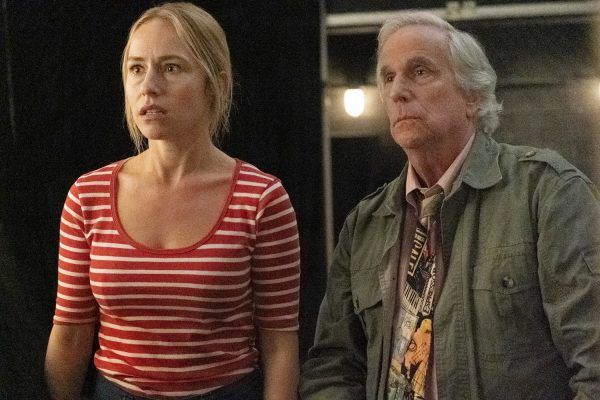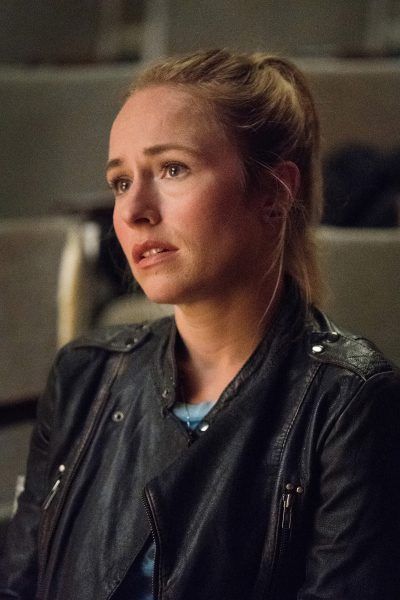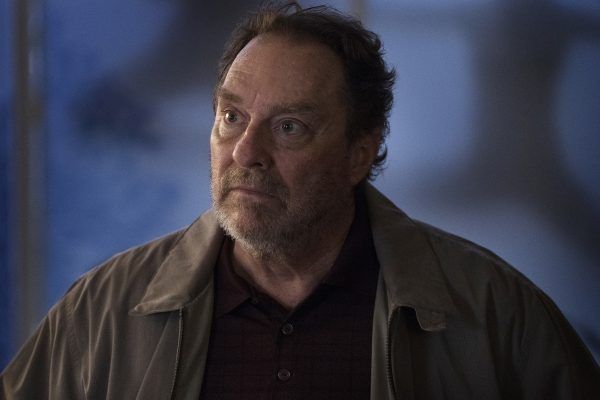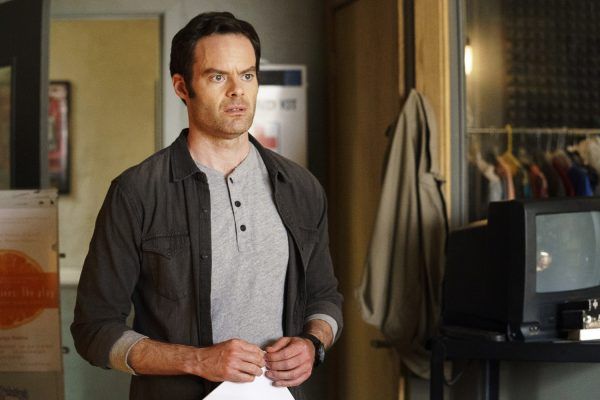Spoilers for Barry Season 2 Episode 7 follow below.
In the penultimate installment of Collider’s exclusive episode-by-episode breakdown of Barry Season 2 with the show’s co-creator, co-showrunner, star, and sometimes director Bill Hader, we’re digging into the tonal diversity of the series. While billed as a half-hour comedy, Barry has proven time and again to be a show that’s just as comfortable exploring the dramatic depths of its characters as it is delighting in a well-timed “Hey man” from Anthony Carrigan’s Noho Hank. The show is comedic and dramatic; hilarious and tragic; silly and emotionally grounded. It’s part of the reason why I think Barry resonates so much with viewers.
Life is, after all, full of both comedy and tragedy, and in exploring both to its fullest potential, Barry hones in on, well, something true. It’s a show that is emotionally grounded in honesty, and despite the fact that the characters are hitmen and struggling actors, their personal struggles—which can be alternatively humorous and devastating—feel intensely relatable.
That diversity of tone is front and center in the penultimate episode of the season, which Hader describes as the most sitcom-y the show has ever gotten—before a final, dark twist. In our interview, Hader talked about how Barry’s arc in this episode was a very late development, how much fun he and the team had coming up with fake movies and TV shows like Swim Instructors and Payback Ladies, and how that Jay Roach (or Jayroach) cameo came about. Hader also talked about Sally’s (Sarah Goldberg) showstopping monologue, and how they landed on that jaw-dropping ending.
Check out the full interview below, and be sure to check back next week for a lengthy interview about the finale. That episode's a doozy...
So Episode 7 starts out really funny. Barry falls ass backwards into an audition. How early on did you guys hit upon the idea that you Barry was going to have essentially kind of a big break this season?
BILL HADER: That came very late. That actually came 11th hour late. Episode Seven, writing-wise, Barry had nothing to do in it for a very long time. Liz Sarnoff, who’s one of our best writers, was writing it, and she was very nice but saying, "Guys, I'm writing this draft. Barry doesn't do anything in it. He just kind of follows Sally around." We were like, "Well, what could happen?" We were shooting episodes one and two, and three and four, and we had this script for seven that just had this big Barry-sized hole in it.
And then, [co-showrunner] Alec [Berg] and I sat down and just went, okay, what happened? We were looking at it, and we said, “Oh, it's really interesting that Episode Six he kind of ties up everything in his life.” If you're just following Barry, he's broken up with the Chechens, he's broken up with Fuches, so he's in a good place. So let's just say we have this scene where Sally is talking to her agents. What if Barry is there and one of them sees him and he gets an audition? And I remember Liz started off going, "Oh, Barry getting an audition would blow up the entire eco system of the acting class."
It needed to be something big, like a big movie, and it needed to be stupid, and the reason that he gets the audition needed to be something about his looks. It had to be nothing to do with his talent. So, “Are you 6’2”?” was the kind of thing that led us. So what was funny was this episode, as we started then rethinking it, it was like, oh this is the most sitcom that Barry gets. It's the most sitcom-y episode we’ve ever done, and it was almost like sitcom jokes.
With “Jayroach.”
HADER: (Laughs) Yeah, “Jayroach,” all those things, and then the idea of Sally going and meeting that guy about the show and Payback Ladies. Alec and I were having a lot of fun writing all that because we were thinking—and that was one that I had pictures of Alec and I trying to figure that out. We were in my apartment. Our heads almost exploded. We knew she needed to have a meeting. We knew that a meeting needed to go bad, but the guy needed to say something that offended her and it had to be about his perception or kind of like a Hollywood perception of domestic violence and what it does to women. Then it was Liz Sarnoff that said, "Look, there's all these TV shows and movies about women who pick up a gun and start killing people as payback. What if it was that?" Because it's kind of saying, yeah, because you were damaged that turns you into a killer. Sally would be completely offended by that. So Liz kind of came up with it and then we ran with it and came up with Payback Ladies and “It's that time of the month for revenge” and all that stuff.
Which is ridiculous.
HADER: It was really ridiculous but there are those movies…
You could totally see it happening. You could totally see that being a tagline.
HADER: You could see them all coming. It's like what the idea of a strong woman is is a woman with a gun, and that's weird. So we did that and then we were looking at it structurally. We knew we had this ending with Fuches and Cousineau, so it would be great to do a sitcom that then turns to the darkest shit we've ever done in the show. So it's like start off really funny and then have a cool bus action sequence and then just hit you with the most fucked up thing we've ever done.
And then one of Barry's dads is going to kill his other dad.
HADER: Yeah, but first he's got to show them the dead body to his girlfriend and blow his brains out and then say it's suicide. I'm like, yeah, that would be great (laughs).
Before we get to the dark stuff, where did Swim Instructors come from?
HADER: I just pitched that. There are so many TV shows and movie ideas... I get sent things.
Oh, yeah, that makes sense.
HADER: Movies where the title is what it’s about. So I just said Swim Instructors and Alec started laughing really hard. It was like, "Oh, that's so shitty." So it's Swim Instructors and Payback Ladies and the other shows that he did. It's a joke that Maggie Carey and I used to have. We'd drive by and we'd see a poster for something that was like Payback Ladies and she would go, “Oh, what do you think that's about?" (laughs)
That's funny. And then so how do you pitch Jay Roach on coming in?
HADER: He was just the best dude ever and was just like, "I'd love to." He was directing the Roger Ailes movie, so he's in the middle of directing the Roger Ailes thing, and he had a day off and said, "Yeah, I'll come in." And that's really Allison Jones, our casting director. I couldn’t believe it. But again, all this happened very quickly. I remember Aida Rogers, our producer, going, "Hey guys, we need a script for seven because we need to start casting it. We really need a script for seven." And we just kept saying "Barry's not doing anything yet. We don't know what Barry's doing in seven." I was on the set of episode four, right? And we don't know what seven is, and she's like, "I need it like yesterday." So that was really stressful.
I can imagine. This is a really great Sally episode and I wanted to talk about when she delivers her monologue outside Barry's place. She's terrific in that scene and she has a lot to juggle and a lot of things to say and a lot of things that you could imagine Barry reacting to in different ways. But I wanted to talk about the decision to keep the camera only on Sally for the entirety of that monologue. How did that came about?
HADER: Well, that came about where Alec and I were saying, well, gosh, Sally's feeling all these different things and we need a scene with her and Barry and we kept throwing out what it could be. I remember we were on the phone with Liz Sarnoff going like what would that theme be? We all were just kind of listing how Sally was feeling. Then Sarah Goldberg also had her thoughts on how Sally was feeling and where she was at. The list was really long and we were like, “How do we hit all these in a thing?” and then I said, "Well, you know, what I'm sure Sarah can do is I'm sure Sarah could do a three-minute monologue without breathing." Because Sarah is a theater trained actress and she can memorize large amounts of dialogue and then she can say it incredibly fast. So it was a bit like showing off our cast member where it was like, "I bet you can do this and you can do this in one shot." So there's no trick. It really is just shot on her and do it just that way. And Alec was like, "Yeah." Then we take it to Sarah. I said, "Hey, do you want to do a two-page monologue that has like no commas in it, no punctuation and we're never going to cut? It's just going to be on you?" And she was like, "Oh, my God, I love that. Are you joking? It's my dream."
She did four takes of it. All four of them were perfect. The crew would applaud after each one. But it was just to show where she is at and that she's feeling all these things, and she's someone unlike Barry that has to share it all at once. I think it's a sign of growth for her that she could say "I'm really fucking jealous of you right now. Even though Swim Instructors is absolute shit, I am so jealous." And I feel like that's a thing that so many struggling actors go through, when you're just like I can't believe they got that thing, I'm so jealous even though I think it's a dumb thing, that thing is going to be huge.
Earlier in the series you can imagine her doing kind of the passive aggressive kind of smile, and “Oh I'm so happy for you,” without saying what she’s really feeling.
HADER: Exactly. And this is her going, "No, I love you and I'm caring about you and I'm trying to be a better person here, but I’ve got to be real with you. If you get this, I will be happy for you but I will also kind of hate you. I'm being honest.” Like this whole season is about “I'm trying to be honest.” So that's her honesty monologue and so the combination of her going through a lot and us wanting to express it and get it into a scene and then having an actor who could handle that. Not only handle it but specializes in it. Where you go “Oh, give Sarah Goldberg three pages and she'll rattle it off. No problem.”
It's terrific.
HADER: So, yeah, that's where that came from and that's one of my favorite moments of the season. I love when she kind of talks to herself. It just gives you such insight into that character. And Paula Huidobro, the DP, was laughing because she said, "The way you look at her at the end of the scene I feel like so many men look at me that way." (laughs)
I saw that look and I was like I completely get that. I get that look.
HADER: Yeah. Yeah. It was such a very male/female thing on set where a lot of women were like I have so felt like her and the guys were like, no, I've given that look to my girlfriend or wife before. (laughs)
“What is the correct response here?”
HADER: “How do I respond to that?”
I also really liked that we got to see Sally’s agent vouch for her. It’s this really great example of women being allies for each other, and earlier in the season you’re not really sure how this is gonna play out.
HADER: Oh, Jessy Hodges is a wonderful actress. We purposely wanted Lindsay in Episode 2, when you're introduced to her, to be someone you don't know if you can trust yet. And then as it goes on you kind of realize, oh, she can trust her, she's got her best interests in mind. Lindsay cares about her. I mean, part of it is women in the industry, but I think the other part is just in a story way that you've seen the dipshit agent so many times and when we would talk about it in the writer's room I'm like, "I mean, I've had bad agents and I've had agents that have been really good to me." Like you saw in Episode 8, like “I put you in that situation, I’m sorry,” I mean, Lindsay's not infallible. She wants to further her career and help herself. That's why she puts together that big showcase at the end, but then she feels really bad about it. Like, “Fuck, for the sake of art, I'm putting someone in a position where they have to be incredibly vulnerable and discuss something that's really hard to talk about."
Yeah I really liked that stuff. Then of course, you get to the Gene and Fuches stuff, so it just gets so dark.
HADER: Yeah, yeah. I remember writing it and going, "Okay, so Fuches is like really mad, so what would Fuches do?" I just remember us just saying we came up with ideas that didn't involve Gene, I just was feeling like if I'm Fuches, I'm just like I'm so fucking sick of hearing about Cousineau, I need to blow up Cousineau. I need to blow up the acting class. Things have to go the fuck away or my livelihood is over with, right? And then he became more kind of bitter and spurned.
Yeah, like the spurned ex-lover.
HADER: Spiteful. It became like, "Well, he's just going to blow up Barry's life," but he loves Barry so he's not going to kill Barry, you know what I mean? It's a complicated thing where it's like, oh, yeah, you like your new girlfriend, huh? Well, watch this. I'm going to tell her that I know you're cheating on her or I know you used to do drugs or whatever it is. I just want to blow up your fucking thing. So once we kind of got that dynamic down, it's like well, what does that look like? Then we started talking about, “Well, what if Fuches took Cousineau out to the body?” and everyone got really into that. Everyone liked that idea. Then we got to him showing him the body and then I remember pitching that Fuches takes out a gun and puts it in the back of Cousineau's head and we cut to black.
Which is the meanest thing you've ever done.
HADER: (Laughs) Yeah, yeah. He puts the gun to his head, cuts to black and then Alec was like “What!? We're blowing up the entire series.” It's one of those things you kind of throw out there, “Wouldn't it be great to just end with that and him calling the cops, pretending to be Cousineau?”
I think it works and I think going into that scene you have no idea what's going to happen. I didn't necessarily think he was going to pull the gun out and put it to his head, but I kind of thought he was setting up a standoff between Barry and Gene to kind of reveal what Barry had done.
HADER: Yeah. I think the other thing that we had was that we had him when he calls Barry on the phone, when Barry has his audition, we had Fuches going, “I'm going to take him out to the woods and show him the body and then I'm going to fucking kill him." Like we had that bad writing and then when we watched the cut of it I was like, "Ugh, take that out. Why the hell do we have that?” Because you're so terrified that people aren't going to get it. You write these insurance lines that then just stick out like a sore thumb. And you're so terrified that people watch it and go, “Wait, I'm confused. What happened?”
So we shot him basically saying what he's going to do. I mean, it telegraphs the whole thing, but we have it in case you need it. But Alec I think just did a wonderful job directing it and I think he also just built up how sinister it is. My favorite two parts of Episode 7 are Sally's monologue and then I love the look on Stephen's face when Cousineau is telling him about Barry, that he was lost. That he had nobody.
I was going to say I think that that's the key to making that turn work really well, like that's what pushes Fuches even further. I mean, I think he already has the intention of doing whatever, but you can just feel him seething where it's these two dads, one doesn't know he's the other dad, but he's essentially saying Barry had no one until he found me.
HADER: He had no one until he found me and he was totally lost. Alec wrote that scene and he kind of wrote it out, he goes, "This should be something like this, right?" I just went, "Something like this? It's this! Don't fucking change a word. This is perfect." I was like, this just makes like exactly what you're saying. Now the thing makes sense. The way Stephen played it, that look on his face when he's telling him, he's so hurt.
It's such a knife twist.
HADER: And you go oh, yeah, he's doing this because he's hurt. Because he loves Barry.
Which makes it sad ultimately.
HADER: It makes it emotional and real as opposed to like a plot thing.
Yeah, I mean, Fuches is an asshole, but you kind of understand a little bit of where he's coming from.
HADER: Yeah, you need to have a level of empathy for all the characters. Sally has her monologue. Noho Hank has his monologue in the bus where he's like—which is to me at the beginning of Episode 1 he did the whole scene where he's a hard ass, and I remember when we wrote that scene going “Okay in the bus scene...” because we knew we were going to do a scene on the bus. When writing Episode 1 it was like “In the bus scene in 7, it should be the flip of this. It should be I'm not this, I'm not that guy.”
And he can't take it back because he loses the men forever after that.
HADER: Yeah, he can't take it back and then he's fucked. But because Barry has trained the guys, then they show they're great because Barry trained them. So it's all causal, you know? It's like it's not like suddenly they're great. They're great because of Barry.
Barry airs on HBO on Sunday nights. If you missed my previous episode-specific breakdowns with Hader, check them out below.
- Bill Hader Breaks Down the ‘Barry’ Season Premiere
- Bill Hader on ‘Barry’ Season 2 Episode 2, That Ending, and Hiro Murai
- Bill Hader on ‘Barry’ Season 2 Episode 3 and Not Having a Master Plan
- Bill Hader on ‘Barry’ Season 2 Episode 4 and Ensuring Sally’s Story Rings True
- Bill Hader Goes Deep on Making the Incredible ‘Barry’ Season 2 Episode 5
- Bill Hader on How Last-Minute Reshoots Saved 'Barry' Season 2 Episode 6

